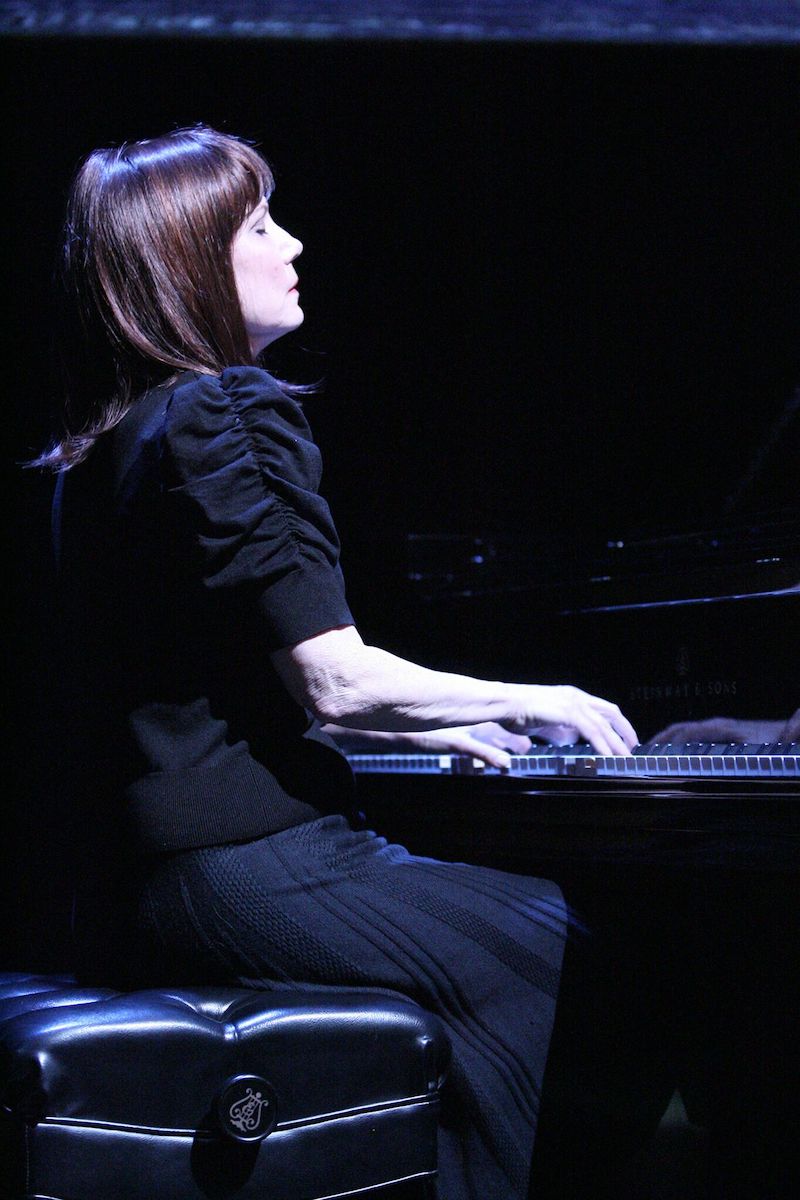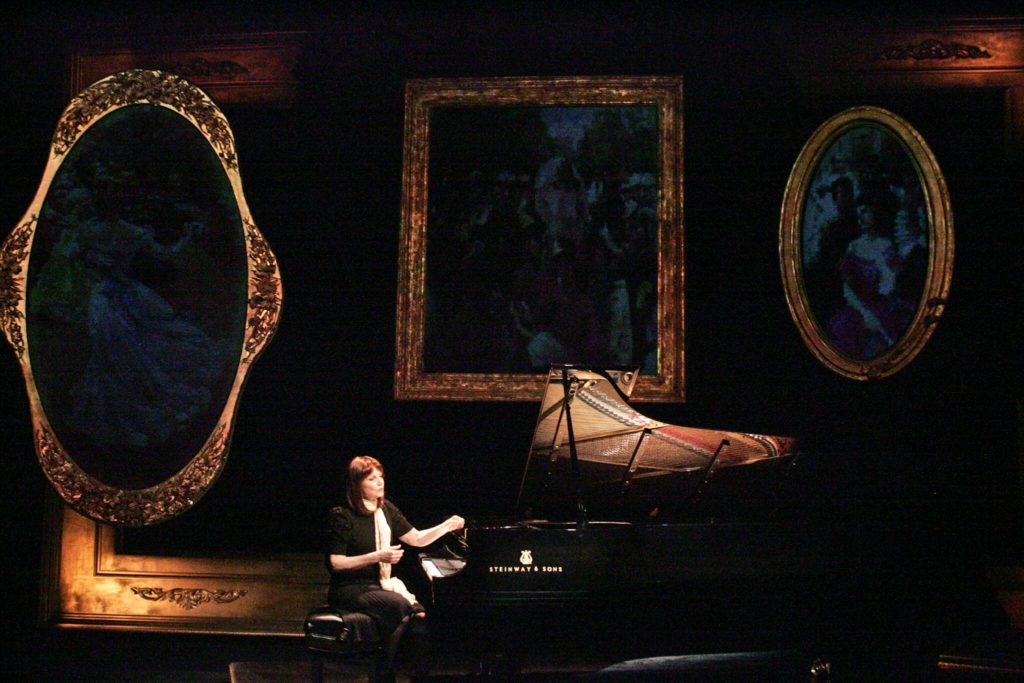The spellbinding tale of pianist Lisa Jura cannot be told too often. In a return engagement at Theater J, Lisa’s daughter Mona Golabek channels her mother in The Pianist of Willesden Lane, a unique and memorable 90-minute tour de force that combines performances of classical masterpieces with a dramatic narrative of Lisa’s escape from Nazi-occupied Vienna in 1938.
Through the eyes of a talented 14-year-old, we see how suddenly and irrevocably life had changed. Taking a trolley to her music teacher’s house one Friday, she sees that his street has been renamed from Mahler-Strasse to Meistersinger-Strasse because the legendary composer Gustav Mahler, a Jew, was being erased. Reaching her professor’s door, she learns that he is no longer permitted to offer her lessons. Next came Kristallnacht, the violent two-day rampage that left thousands of Jewish-owned businesses and synagogues destroyed throughout the Reich, and its Jewish population shell-shocked.
Lisa’s parents found space for her aboard one of the Kindertransports, a rescue effort that brought 10,000 Jewish children out of Nazi-controlled countries to the United Kingdom just prior to World War II. It was an agonizing choice. The Juras had three daughters and one space on a train and boat headed to safety. This precious place had been won by her father, a tailor who turned to gambling to support his family. The teenage Lisa, an iron-willed piano prodigy, was chosen to go.

Once in England, Lisa was placed in a baronial home with a piano that the housekeeper refused to have played lest it disturb the elderly lord of the manor. For months, she contented herself by practicing in the air, just above the keys. Finally, with a big measure of pluck and a bit of luck, Lisa escaped from her host and landed at a modest hostel on Willesden Lane in London, where she survived the war in the company of supportive new friends, a sympathetic landlady, and an aging upright piano. Hunkering down amidst the blitzkrieg and agonized with worry about the family she left behind, Lisa practiced doggedly for her “moonshot” — an audition at the Royal Academy of Music.
Lisa’s daughter and musical heir Mona wrote movingly of her mother’s journey in a 2002 book co-authored with Lee Cohen and later adapted by Emil Sher into an abridged edition for young readers. The stage version was created in 2012 in collaboration with director and playwright Hershey Felder. It premiered in 2012 and was first presented in the DC area by Theater J at the Kennedy Center in 2018. The new Theater J production marks the first time that the show has been mounted since the pandemic.
Golabek traces her mother’s journey from an adolescent refugee to young adulthood through a series of moving vignettes detailing her love of Vienna, memories of her family, and the stress of adapting to a new life in temporary shelters. As she settles into wartime London and prepares for her eventual debut, the sustaining power of music builds steadily with Golabek’s richly textured renditions of works by Beethoven, Chopin, Debussy, Grieg, Rachmaninoff, and others.
The production design by Hershey Felder and Trevor Hay provides a vivid backdrop to Lisa’s tale. Gilt-edged screens (designed by Andrew Wilder and Greg Sowisdrzal) glow with projected still images of Lisa’s family and imperial Vienna. Gradually, they are supplanted with the now familiar but still shocking films of jack-booted oppressors and flaming debris. Jason Bieber’s superb lighting and Erik Carstensen’s sensitive sound design are pitch-perfect, elucidating Lisa’s narrative and drawing out our collective memories and deepest emotions.

But it is Mona’s impassioned musicianship that sustains this mesmerizing evening. Every time she sits down at the piano, we can see her back stiffen and her head lifted in silent veneration of the mother whose stories and musical gifts flow ceaselessly through her talented daughter. Bringing Lisa’s tale to life throughout the United States and abroad has clearly become a life’s work for Mona Golabek. She estimates that her book and play have touched at least two million people worldwide. She reminds us that when all else changed, the music defied evil, providing beauty and purpose during the most tragic of eras. With hate crimes on the rise again, and alarming flares of antisemitism, Golabek’s shining performance offers a magnificent and searing beacon of light.
Running Time: 90 minutes, with no intermission.
The Pianist of Willesden Lane plays through December 18, 2022, at Theater J at the Aaron & Cecile Goldman Theater in the Edlavitch DC Jewish Community Center, 1529 16th Street NW, Washington, DC. Purchase tickets ($65, with member and military discounts available) online or by calling the ticket office at 202-777-3210.
The program for The Pianist of Willesden Lane is online here.
COVID Safety: All patrons in the Goldman Theater are required to wear masks covering their nose and mouth. Only performers and guests invited onstage may be unmasked. Masks are optional but encouraged in the Q Street and 16th Street lobbies, hallways, and other public spaces. For more information, visit Theater J’s COVID Safety Guidelines.

Based on the book The Children of Willesden Lane by Mona Golabek and Lee Cohen
Adapted and directed by Hershey Felder
SEE ALSO:
A storyteller at the Steinway: Acclaimed pianist returns to DC at Theater J (interview with pianist Mona Golabek by Ravelle Brickman, originally published September 24, 2018)
“The Pianist of Willesden Lane” by Theater J (review by Ian Thal, September 16, 2018)





Saw this in NYC years ago. While I admired the production values, especially the “ghosts” in the paintings hovering over her, I felt the script for this one-woman show was all exposition and narration with very little, if any, character development, suspense or tension.
Another issue is that this amazing pianist-actress isn’t really much of an actress. She delivers her lines in a very monotonous, very slow style and the slow-paced, unimaginative direction doesn’t help.
After a while the repetition of “story thenpiano piece” becomes tedious and you get the point after 30 minutes (maybe less.)
A+ for the piano work and production design
C- for script,acting and direction